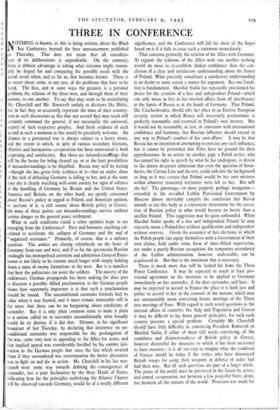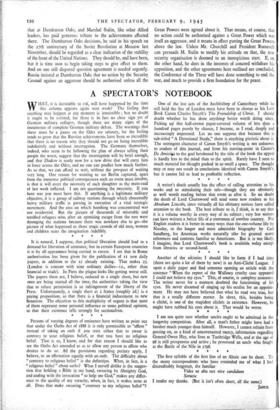THREE IN CONFERENCE
NOTHING is known, as this is being written, about the Black Sea Conference beyond the bare announcement published on Thursday. That does not mean that all consideration of its deliberations is unprofitable. On the contrary, there is definite advantage in asking what outcome might reasonably be hoped for and comparing the possible result with the actual result when, and so far as, that becomes known. There is no secret about some, at any rate, of the problems that have to be faced. The first, and in some ways the greatest, is a personal problem, the relation of the three men, and through them of their nations, to one another. To say that may seem to be assimilating Mr. Churchill and Mr. Roosevelt unduly to dictators like Hitler, but in fact they so accurately represent the mass of their countrymen in such discussions as this that any accord they may reach will certainly command the general, if not necessarily the universal, respea of their respective peoples. And fresh evidence of such accord at such a moment as this would be peculiarly welcome. An alliance in a protracted war is always subject to a heavy strain, and the extent to which, in spite of various secondary frictions, effective and harmonious co-operation has been maintained is both surprising and satisfactory. But there are misunderstartings that will be the better for being cleared up, or at the least possibilities of misunderstandings to be dispelled. Russia may well be feeling —though she has given little evidence of it—that an undue share of the task of defeating Germany is falling to her, and at the same time she is clearly watching with some anxiety for signs of softness in the handling of Germany by Britain and the United States. America and Britain, on the other hand, are openly concerned about Russia's policy in regard to Poland, and American opinion, or sections of it, is still uneasy about British policy in Greece. On none of these points can misunderstandings survive without serious danger to the general peace settlement.
What in such conditions could a sober optimist hope to see emerging from the Conference? First and foremost, anything calculated to accelerate the collapse of Germany and the end of "organised resistance." Primarily, of course, that is a military question. The armies are closing relentlessly on the heart of Germany from east and west, and if so far the spectacular Russian onslaught has. monopolised attention and admiration General Eisenhower is not likely to be content much longer with simply holding down a mass of enemy formations in the west. But it is manifest that here the politicians can assist the soldiers. The naivety of the endelvours German propaganda has been making f6r days past to discount a possible Allied proclamation to the German people shows how supremely important it is that such a proclamation should be issued. The unconditional surrender formula had its value when it was framed, and it must remain immutable still in the sense that there can be no bargaining about conditions of surrender. But it is only plain common sense to make it plain to a nation called on to surrender unconditionally what broadly would be its destiny if it did that. Dittmar, in his significant broadcast of last Tuesday, by declaring that insistence on unconditional surrender. was responsible for the prolongation of the war, came very near to appealing to the Allies for terms, and that implied appeal was considerably fortified by his sombre intimation to the German people that since the fate which awaited them if they surrendered was extermination the better alternative was to fight on and die in action. Mr. Churchill in his last warspeech went some way towards defining the -consequences of surrender, but a joint declaration by the three Heads of States, indicating how far the principles underlyin the Atlantic Charter will he observed towards Germany, would be of a totally different significance, and the Conference will fall far short of the hopes based on it if it fails to issue such a statement immediately.
That concerns primarily the relation of the Allies with Germany. As regards the relations of the Allies with one another nothing would do more to re-establish shaken confidence than the conclusion of a clear and satisfactory understanding about the future of Poland. What precisely constitutes a satisfactory understanding is no doubt to some extent 3 matter for argument. But onelondition is fundamental. Marshal Stalin has repeatedly proclaimed his desire for the creation of a free and independent Poland—which can only mean as free in her internal affairs from all interference at the hands of Russia as at the hands of Germany. That Poland, like Czechoslovakia, should take her place in an Eastern Europeau security system in which Russia will necessarily predominate is perfectly reasonable, and essential in Poland's own interest. But it would not be reasonable, or just, or consistent with international confidence and harmony, that Russian influence should extend in any way to Poland's conduct of her own affairs. It may be that Russia has no intention of attempting to exercise any such influence, but it cannot be pretended that Poles have no ground for their apprehensions. In an article on another page a Polish writer, who has earned his right to speech by what he has undergone, is driven to the almost desperate admission that even the question of boun• daries, the Curzon Line and the rest, could sink into the background so long as it was certain that Poland would be her own mistress within whatever truncated territories were left to her. But will .she be? The patronage—or more properly perhaps instigation— extended to the so-called Lublin Provisional Government by Moscow almost inevitably compels the conclusion that Russia intends to use this body as a convenient instrument for the execution of Russian policy in what would become no better than a satellite Poland. This suggestion may be quite unfounded. When Marshal Stalin speaks of a free and independent Poland he may sincerely mean a Poland.free without qualification and independent without reserves. Given the assurance of free elections, at which the Polish people can equip themselves with a Government of their own choice, held under some form of inter-Allied supervision, not under a purely Russian occupation, the temporary ascendancy of the Lublin administration, however undesirable, can be acquiesced in. But that is the minimum that is necessary.
There is much more that will be looked for from the Three Power Conference. 'It may be expected to reach at least provisional agreement on the measures to be applied to Germany immediately on her surrender, if she does surrender, and later. It may be expected to accord to France the place it is both just and politic to accord to her in the counsels of the nations, which may not unreasonably mean converting future meetings of the Three into meetings of Four. With regard to such vexed questions as the internal affairs of countries like Italy and Yugoslavia and Greece it may be difficult to lay down general principles, for each such country presents a special problem. Certainly Mr. Churchill should have little difficulty in convincing President Rodsevelt or Marshal Stalin, if either of them still needs convincing, of the soundness and disinterestedness of British policy in Greece, however distasteful the measures to which it has been necessary to have recourse ; it is all too easy to imagine what the condition of Greece would be today if the critics who have denounced British troops for using their weapons in defence of order had had their way. But all such questions are part of a larger whole. The peace of the world must be preserved in the future by active, and armed, co-operation, not between a few powerful States alone, but between all the nations of the world. Provision was made for that at Dumbarton Oaks, and Marshal Stalin, like other Allied leaders, has paid generous tribute to the achievements effected there. The Dumbarton Oaks decisions, he said in his speech on the 27th anniversary of the Soviet Revolution at Moscow last November, should be regarded as a clear indication of the stability of the front of the United Nations. They should be, and have been, but it is time now to begin taking steps to give effect to them. And on one still disputed question agreement is needed urgently. Russia insisted at Dumbarton Oaks that no action by the Security Council against an aggressor should be authorised unless all the Great Powers were agreed about it. That means, of course, that no action could be authorised against a Great Power which was itself an aggressor, and it means in effect putting the Great Powers above the law. Unless Mr. Churchill and President Roosevelt can persuade M. Stalin to modify his attitude on that, the new security organisation is doomed to an inauspicious start. If, on the other hand, he does in the interests of concord withdraw his opposition, and the other agreements here outlined are concluded, the Conference of the Three will have done something to end the war, and much to provide a firm foundation for the peace.























 Previous page
Previous page